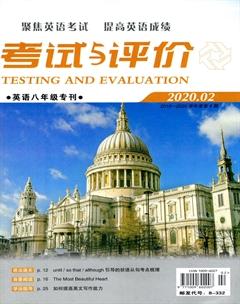请您帮帮忙好吗?
曲永华
常言道:良言一句三冬暖,恶语伤人六月寒。什么叫高情商呢?就是会说话、会办事。说起话来让人听起来舒服,做起事来让人感到温暖。你想做一名高情商、会说话办事的人吗?那么就跟我一起学习吧!看看情态动词could到底如何使用。
一、情态动词could的用法
1. can 的过去式;
2. 礼貌地请求;
3. 提出建议;
4. 表推测。
二、提出礼貌的请求
1. Could you +动词原形+...?
2. Could you please+动词原形+...?
意为“请你做……好吗?”,句型2比句型1语气更加委婉。
肯定回答:Yes, sure. / Sure. / Of course. / No problem.
否定回答:Sorry. / Sorry, I can't.
—Could you please close the window? 请你关上窗户好吗?
—I'm afraid not. 恐怕不行。
其否定结构为:Could you (please) not do...?
三、表示请求许可
1. could表示请求允许,其句型结构为:
Could I / we +动词原形+...?意为“请问我(们)能做……吗?”
肯定回答:Sure. / Of course. / No problem.
否定回答:I'm sorry... / Sorry, you can't.
特别提示:在以上句子结构中情态动词could不是can的过去式,而是用来表示委婉语气的,后跟动词原形。
Could I come in? 我可以进来吗?
2. 另外,用Could I...时,表示请求对方准许,对方回答时不能用could,而要用can。
肯定回答:Certainly. / Of course. / With pleasure. / No problem. / Sure. / Yes, you can.
否定回答:I'm afraid not. / No, I'm afraid you can't. / No, you can't.
—Could I use your bicycle? 我可以用你的自行车吗?
—Yes, you can. 是的,可以。
四、could与can的区别
could与can都是情态动词,could是can的过去式。二者都可用于表示请求,但是用法不同:
1. can表示一般性的请求,语气随便,常用于熟人之间或长辈对晚辈、上级对下级的场合。
Can you tell us your story, Tony? 你能给我们讲讲你的故事吗,托尼?
2. could表示有礼貌地请求,语气委婉,常用于非熟人之间或晚辈对长辈、下级对上级的场合。
—Could you tell us if it snows in winter in Australia? 你能告诉我们澳大利亚冬天是否下雪吗?
—Sure. 当然可以。
【考题链接】
一、单项选择。
1. —___ I close the window? It's cold here.
—Yes, sure.
A. MustB. Will
C. CouldD. Would
2. —Could I bring a friend to your birthday party?
—Sure, ___.
A. no problem B. not at all
C. my pleasure D. well done
3. —Could you please sweep the floor? I'm going to cook dinner.
—___.
A. I'm afraid not B. I hope so
C. That's all right D. With pleasure
4. —Could I borrow your bike, please?
—___.
A. Of course you can
B. It doesn't matter
C. Yes, I'd love to
D. No, thank you
5. —Could you please do the dishes?
—___. I'm busy with my homework.
A. Yes, you can B. Yes, I can
C. Sorry, you can't D. Sorry, I can't
二、按要求完成下列句子,每空一詞。
1. Could you please pass me the salt? (改为否定句)
Could you please ___ ___ me the salt?
2. —Could you please clean the living room?
(作否定回答)
—___, I ___.
3. How about going out for lunch with Jack? (用could改写句子)
___ we ___ ___ for lunch with Jack?
三、根据每小题后的提示语回答下面的问题。
1. Q: Could you please clean your room?
(Sorry / do the dishes)
A: ________________
2. Q: Could I stay out late?
(No / babysit your sister)
A: ________________
3. Q: Could you please make your bed?
(Yes / sure)
A: ________________
4. Q: Could I use your bicycle?
(No / need it today)
A: ________________
5. Q: Could you please take out the trash?
(Sorry / practice the piano)
A: ________________
四、根据汉语意思完成英语句子,每空一词。
1. ——请问我能用一下你的自行车吗?
——不,你不能。我得骑车外出。
—___ I ___ your bike?
—No, you ___. I have to go out.
2. ——当你5岁时,你会跳舞吗?
——不能。
—___ ___ ___ when you were
five years old?
—___, I ___.
3. ——我能在這儿唱歌吗?
——对不起,你不能。
—___ ___ sing here?
—___ ___, you can't.
4. 请递给我那支钢笔好吗?
___ ___ ___ ___ me that pen?
5. ——请你帮我洗衣服好吗?
——对不起,我不能。我必须去上学。
—Could you please help me wash the clothes?
—___, ___ ___. I have to go to school.
五、仔细观察例句,然后判断哪些句子表示请求,哪些句子表示请求允许(Write R for requests and P for permission)。
1. Could you please clean your room?
2. Could you take out the rubbish?
3. Could you please take the dog for a walk?
4. Could I use your computer?
5. Could we get something to drink after the movie?

